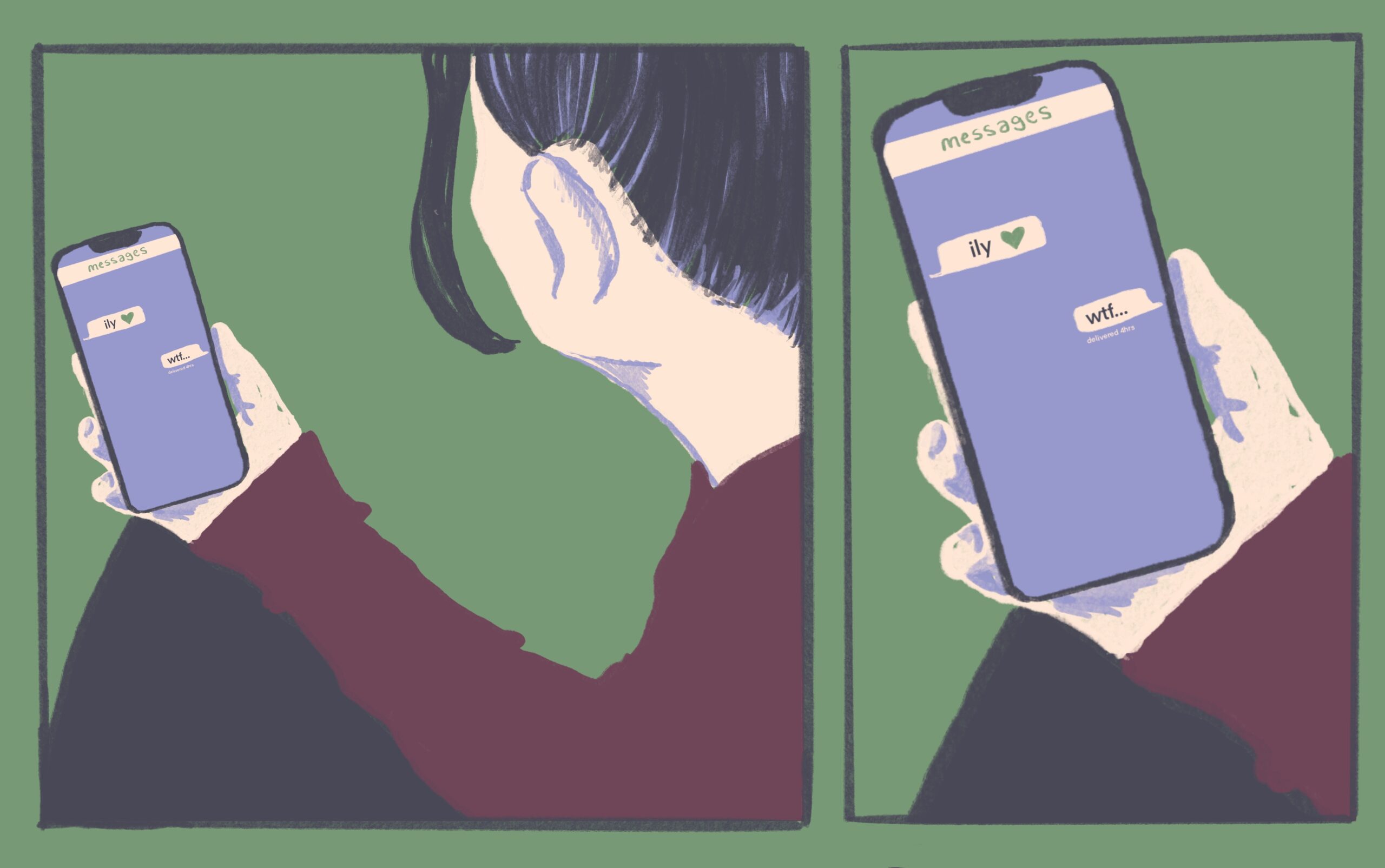Words: George Browne (He/Him)
Artwork: Katie Stewart (They/Them)
Diane Ackerman writes, in A Natural History of Love, that ‘love is the great intangible’. While Ackerman perhaps skilfully skews offering any real definition, she captures the beauty of love’s elusiveness. Love in 2023, nineteen years after Ackerman, has entered a new digital paradigm – one in which intangible and often darker emotions dominate. Our generation, weaned on social media, has caused dilemmas in how we validate the emotions we experience online. Our relationship with our online selves is slippery. While how and what we text, post, and like is a reflection of our desires, we also seek to insert a barrier between our profiles and our true personality. Yet love is something we deserve to centre our lives upon and we should embrace the impossible task of deciphering love’s existence online.
Love entering a new paradigm online provides the opportunity for new ideals of the feeling to be built. Though within a space often associated with false emotion, the ways in which the bond of love can now form and be maintained is diversified by its online presence. We are able to begin our search for love and express it in a multitude of forms and mediums unavailable to many of the stories we have built our conceptions of the feeling on. Who we can be with, where we can meet them and how often we can speak to them are no longer confined to those in our immediate surroundings. The necessity of chance meetings in forming relationships that hold the potential for love has largely dissipated.
A more problematic ideal that online love outdates is simply put in 1 Corinthians 13: ‘Love is patient’. To take Corinthians as bible in formulating what we demand of love online would be wrong, but it highlights the value we place on the slow burn effect of love. The sensation of saying, or hearing, ‘I love you’ is entwined with a sense of delay wherein (we hope) an articulation of desires has occurred – yet it is this very delay that elevates the joy we feel in hearing or saying it. The opportunity for this pause, this patience, is inevitably threatened by the immediacy of our online communication – to text ‘I love you’ is a more frivolous action. There is the danger that for such an extraordinary feeling a sense of disconnection might occur – between the space of one’s self and their online version. We are, in short, often hurried and arguably desensitised by the cultural forms that surround us.
Love occupying an online existence does seem to alter our conceptions of the feeling, but this does not prevent us attempting to instil the tropes that we more commonly associate with its in-person existence. The opacity that can often characterise our conversations with those we love or feel we have the potential to love appears to have been burdened on the dialect of emojis. The diversity of meaning that we attribute to our use of the term love can be seen in what love heart we choose to send – does the double pink heart suggest a sexual tension while the a-typical single red infer a more foundational love? What the fuck does the yellow one mean?!
bell hooks writes, in All About Love, that ‘our confusion about what we mean when we use the word “love” is the source of our difficulty in loving’. Love moving online appears to only further this confusion – not only are we unsure of who we are loving but what version of ourselves is in fact performing the act of loving. Yet this must be reckoned with; we cannot merely fall into the tendency to reject the validity of our online existence. Love, like everything in the digital age, is changing and with it brings both challenges but also exciting possibilities. To ensure that we maintain a functional relationship with the feeling will require constant work. We cannot mourn the loss of protracted courtships nor allow love to adopt the, often thoughtless, pace of online life. If we work at it, love online provides the opportunity to create more democratic ideals surrounding the feeling. And when isn’t work a necessary factor of love?

